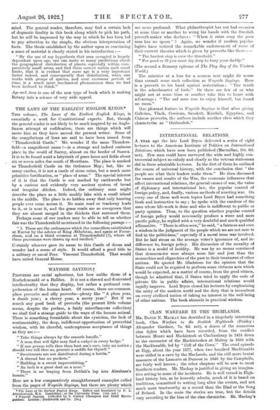INTERNATIONAL RELATIONS.
A YEAR ago the late Lord Bryce delivered a series of eight lectures to the American Institute of Politics on International Relations, which have now been published (Macmillan, 10s. 6d. net). Few men could have surveyed the wide and highly con- troversial subject so calmly and clearly as the veteran statesman did in these admirable lectures. In the first of them he outlined the course of universal history, with the conclusion that "the people are what their leaders make them." He then discussed the causes and results of the War, the economic influences that affect international relations, the general causes of war, the value of diplomacy and international law, the popular control of foreign policy, and, finally, various methods of averting war. On every one of these well-worn topics Lord Bryce had something fresh and instructive to say ; he spoke with the candour of the man whose life-work is done and who is indifferent to public or party opinion. Thus, to the question whether popular control of foreign policy would necessarily produce a wiser and more pacific policy, he replied with a very doubtful and much qualified affirmative. "There is often seen," he said, "a fairness and even a wisdom in the judgment of the people which we are not sure ta find in the politicians," especially if a moral issue was involved. But he laid stress on the average voter's ignorance of, and in- difference to, foreign policy. His discussion of the morality of States is a model of lucidity. He was by no means convinced that democracies were always more fair and just than the monarchies and oligarchies of the past in their treatment of other nations. He quoted Mr. Gladstone for the opinion that the State could not be requited to perform some virtuous acts which would be expected, as a matter of course, from the good citizen, though he admitted that, if States tried to apply the code of private life in public affairs, international relations would rapidly improve. Lord Bryce closed his lectures by emphasizing the unity of the modern world and the duty that is incumbent on every civilized nation of taking an interest in the well-being of other nations. The book abounds in practical wisdom.


































 Previous page
Previous page